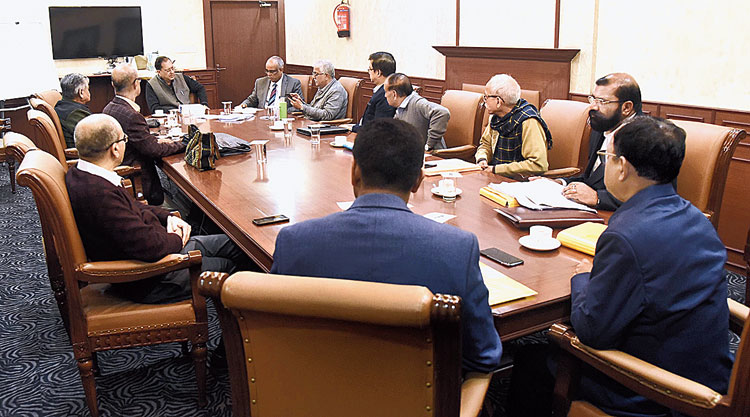The 14-member high-powered committee constituted by the Centre to advise on implementation of Clause 6 of the Assam Accord to give constitutional safeguards to the Assamese people finalised its report on Monday.
The 91-page report is likely to be submitted to Union home minister Amit Shah on February 11, four days before expiry of the term of the committee.
The committee met here for hours on Monday before announcing the finalisation of its report.
The committee was formed in July last year and given six months to submit its report. The deadline was later extended by a month. Over the past seven months, the committee’s members met numerous individuals and organisations, took views of both the Centre and the state government and held several rounds of meetings among themselves.
Committee chairman Biplab Kumar Sarma, a retired judge of Gauhati High Court, said, “Today is a very happy day for us. We have completed our report after working for so many days. We held discussions with several organisations and individuals and considered various aspects before finalising the report.”
Sources said the report touches diverse issues, including reservation for indigenous people in the Assembly and Parliament, jobs, definition of “Assamese” and introduction of inner-line permit in the state.
Prime Minister Narendra Modi, during his visit to Kokrajhar on February 7, had said the Centre would implement Clause 6 as soon it receives the committee’s report.
The Centre is facing flak from the people of Assam over the Citizenship Amendment Act (CAA) which is seen as a violation of the Assam Accord.
The CAA grants Indian citizenship to religiously persecuted persons of six non-Muslim communities from three neighbouring countries who fled to India before 2015 while the Assam Accord sets midnight of March 24, 1971 as the cut-off date for entry of immigrants irrespective of religion.
Clause 6 envisages constitutional, legislative and administrative measures to safeguard, protect, preserve and promote the cultural, social, linguistic identity and heritage of the Assamese people.
There have been several attempts to define the term “Assamese”, including one by former Speaker Pranab Gogoi, who passed away recently. In his report tabled in the Assembly amid opposition by members of his own party (the Congress), Gogoi had recommended that National Register of Citizens (NRC) 1951 should be taken as the basis for definition of “Assamese”. However, no definition has been accepted by the government so far.
Sarma said, “There has been a question of who is an Assamese. We have tried to define the term.”
Sources said the committee’s definition is largely based on Gogoi’s report but is “more specific”.
Samujjal Kumar Bhattacharjya, adviser to the All Assam Students’ Union (AASU), which was a signatory to the 1985 Assam Accord, said Clause 6 was promised to the Assamese people as Assam had taken the burden of illegal immigrants between 1951 and 1971.
Sources said the committee’s three AASU members were likely to skip the meeting with Shah on February 11 in protest against the CAA.
Amidst the anti-CAA protests in the state, BJP leaders in Assam, including chief minister Sarbananda Sonowal, have been telling the people that the Centre was concerned about Assam and, therefore, would implement Clause 6.










